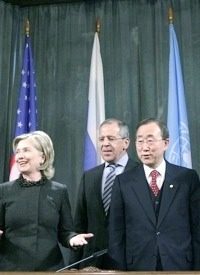
The quartet — a group comprised of the United States, Russia, the European Union, and the United Nations that focuses on Middle East peace — met in Moscow on March 19. At the meeting, Secretary of State Hillary Clinton said that the proposals offered by the Israeli government to reduce diplomatic tensions with the United States were “useful and productive,” and that the Obama administration would continue talks with Israel in Jerusalem and Washington.
The New York Times reported that the quartet condemned Israel’s recent announcement of a housing plan for Jews in East Jerusalem for the second time in a week. In a statement, the group said it would “closely monitor developments in Jerusalem and … keep under consideration additional steps that may be required to address the situation on the ground.”
The Times also quoted Clinton’s statement that the United States was focused on successfully launching indirect talks between the Israelis and Palestinians, which would be mediated by the administration’s special representative to the region, George J. Mitchell. (Mitchell, like Mrs. Clinton’s husband, former President Bill Clinton, is a member of the internationalist Council on Foreign Relations [CFR]).
“We all condemned the [Israeli housing plan] announcement, and we all are expecting both parties to move toward the proximity talks and to help create an atmosphere in which those talks can be constructive,” Mrs. Clinton said.
Mitchell plans to meet with Israeli Prime Minister Benjamin Netanyahu and Palestinian President Mahmoud Abbas during the upcoming weekend, and Netanyahu probably will meet with Mrs. Clinton when he comes to Washington on March 22 to address the annual meeting of the American Israel Public Affairs Committee, a pro-Israel lobbying group.
The quartet also announced for the first time that it supported a plan by the Palestinian Authority to build an independent state within 24 months “as a demonstration of Palestinians’ serious commitment to an independent state that provides good governance, opportunity, and justice for the Palestinian people.”
An article in the British Guardian newspaper for Marcy 19 noted:
The quartet predictably welcomes the "readiness to launch proximity talks" between Israel and the Palestinians, but rightly calls them an important step towards "the resumption, without preconditions, of direct bilateral negotiations that resolve all final-status issues as previously agreed." American mediation, that signals, can be no substitute for face-to-face bargaining about bottom lines.
It repeats support for the August 2009 plan by the PA to build a Palestinian state within 24 months: that is a none-too-subtle reminder to Israel that 42 years since the 1967 war, talks cannot be open-ended and that failure in bilateral negotiations could well mean the unilateral establishment of a Palestinian state and recognition by the rest of the world.
A report from China’s official Xinhua news service quoted the Israeli prime minister’s office that Netanyahu, on the night before the quartet meeting, had called Secretary of State Clinton, proposing a "trust-building" formula to push forward the Israeli-Palestinian peace talks.
The report cited an earlier Washington Post story that Netanyahu, who is prohibited legally from rescinding Israel’s building program in East Jerusalem and the West Bank, would offer a de facto freeze on settlement construction, and promise that no building work will begin in the disputed areas several years. The dispute has long been at the forefront of the intractable Israeli-Palestinian feud.
After the conversation between Netanyahu and Clinton, a U.S. State Department spokesman said the Obama administration is going to "review the Prime Minister’s response and continue our discussion with both sides to keep proximity talks moving forward."
A Washington Post report for March 19 noted:
Officials said that Clinton and President Obama, who jointly wrote the points for her call last Friday [March 12], were furious that Israel announced that 1,600 housing units were being planned in East Jerusalem as Vice President Biden was on a goodwill trip to Israel. Netanyahu agreed that the timing of the announcement was poor, but he has publicly maintained that Israel has a right to build in parts of Jerusalem that it annexed after the 1967 war, a move not recognized by other nations. Palestinians want to claim East Jerusalem as the capital of a Palestinian state in any peace deal.
The official Israeli position is that east Jerusalem is part of Israel and that outside efforts to restrict building there must be rejected. As the Post noted above, however, Palestinians plan to make east Jerusalem the capital of a future state they hope to establish in the West Bank and the Gaza Strip.
?The official U.S. policy has usually been to insist that the status of Jerusalem must be resolved through negotiations between the Israelis and Palestinians. However, Americans, like most outside observers, are bound to hold varying opinions concerning the legitimacy of each of the opposing sides’ claims to disputed territory in the West Bank and east Jerusalem. But why should the U.S. government be involved?
U.S. foreign policy often is subjugated to the will of the UN, and as these reports note, the UN — and the regional government known as the EU — hold positions on the “quartet” equivalent to those of sovereign states.
The involvement of the UN in the ongoing disagreements between Israel and the Palestinians is an affront to the sovereignty of nations. U.S. foreign policy should be dictated by our Constitution, in adherence to the wisdon offered by our founders, and Israel’s by its own system of law. Just as imporant, neither nation’s policies should be dictated to by the UN.???
Photo: AP Images



